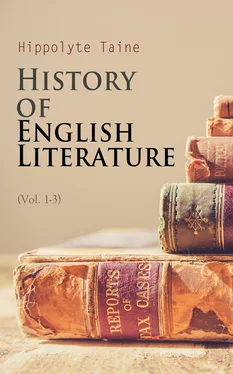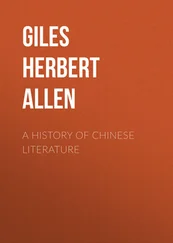VII. Law of formation of a group. Examples and indications
Table of Contents
Having reached this point, we can obtain a glimpse of the principal features of human transformation, and can now search for the general laws which regulate not only events, but classes of events; not only this religion or that literature, but the whole group of religions or of literatures. If, for example, it is admitted that a religion is a metaphysical poem associated with belief; if it is recognized, besides, that there are certain races and certain environments in which belief, poetic faculty, and metaphysical faculty display themselves in common with unwonted vigor; if we consider that Christianity and Buddhism were developed at periods of grand systematizations and in the midst of sufferings like the oppression which stirred up the fanatics of Cevennes; if, on the other hand, it is recognized that primitive religions are born at the dawn of human reason, during the richest expansion of human imagination, at times of the greatest naïveté and of the greatest credulity; if we consider, again, that Mohammedanism appeared along with the advent of poetic prose and of the conception of material unity, amongst a people destitute of science and at the moment of a sudden development of the intellect—we might conclude that religion is born and declines, is reformed and transformed, according as circumstances fortify and bring together, with more or less precision and energy, its three generative instincts; and we would then comprehend why religion is endemic in India among specially exalted imaginative and philosophic intellects; why it blooms out so wonderfully and so grandly in the Middle Ages, in an oppressive society, amongst new languages and literatures; why it develops again in the sixteenth century with a new character and an heroic enthusiasm, at the time of an universal renaissance and at the awakening of the Germanic races; why it swarms out in so many bizarre sects in the rude democracy of America and under the bureaucratic despotism of Russia; why, in fine, it is seen spreading out in the Europe of to-day in such different proportions and with such special traits, according to such differences of race and of civilizations. And so for every kind of human production, for letters, music, the arts of design, philosophy, the sciences, state industries, and the rest. Each has some moral tendency for its direct cause, or a concurrence of moral tendencies; given the cause, it appears; the cause withdrawn, it disappears; the weakness or intensity of the cause is the measure of its own weakness or intensity. It is bound to that like any physical phenomenon to its condition, like dew to the chilliness of a surrounding atmosphere, like dilatation to heat. Couples exist in the moral world as they exist in the physical world, as rigorously linked together and as universally diffused. Whatever in one case produces, alters, or suppresses the first term, produces, alters, and suppresses the second term as a necessary consequence. Whatever cools the surrounding atmosphere causes the fall of dew. Whatever develops credulity, along with poetic conceptions of the universe, engenders religion. Thus have things come about, and thus will they continue to come about. As soon as the adequate and necessary condition of one of these vast apparitions becomes known to us our mind has a hold on the future as well as on the past. We can confidently state under what circumstances it will reappear, foretell without rashness many portions of its future history, and sketch with precaution some of the traits of its ulterior development.
VIII. General problem and future of history. Psychological method. Value of literature. Purpose in writing this book
Table of Contents
History has reached this point at the present day, or rather it is nearly there, on the threshold of this inquest. The question as now stated is this: Given a literature, a philosophy, a society, an art, a certain group of arts, what is the moral state of things which produces it? And what are the conditions of race, epoch, and environment the best adapted to produce this moral state? There is a distinct moral state for each of these formations and for each of their branches; there is one for art in general as well as for each particular art; for architecture, painting, sculpture, music, and poetry, each with a germ of its own in the large field of human psychology; each has its own law, and it is by virtue of this law that we see each shoot up, apparently haphazard, singly and alone, amidst the miscarriages of their neighbors, like painting in Flanders and Holland in the seventeenth century, like poetry in England in the sixteenth century, like music in Germany in the eighteenth century. At this moment, and in these countries, the conditions for one art and not for the others are fulfilled, and one branch only has bloomed out amidst the general sterility. It is these laws of human vegetation which history must now search for; it is this special psychology of each special formation which must be got at; it is the composition of a complete table of these peculiar conditions that must now be worked out. There is nothing more delicate and nothing more difficult. Montesquieu undertook it, but in his day the interest in history was too recent for him to be successful; nobody, indeed, had any idea of the road that was to be followed, and even at the present day we scarcely begin to obtain a glimpse of it. Just as astronomy, at bottom, is a mechanical problem, and physiology, likewise, a chemical problem, so is history, at bottom, a problem of psychology. There is a particular system of inner impressions and operations which fashions the artist, the believer, the musician, the painter, the nomad, the social man; for each of these, the filiation, intensity, and interdependence of ideas and of emotions are different; each has his own moral history, and his own special organization, along with some master tendency and with some dominant trait. To explain each of these would require a chapter devoted to a profound internal analysis, and that is a work that can scarcely be called sketched out at the present day. But one man, Stendhal, through a certain turn of mind and a peculiar education, has attempted it, and even yet most of his readers find his works paradoxical and obscure. His talent and ideas were too premature. His admirable insight, his profound sayings carelessly thrown out, the astonishing precision of his notes and logic, were not understood; people were not aware that, under the appearances and talk of a man of the world, he explained the most complex of internal mechanisms; that his finger touched the great mainspring, that he brought scientific processes to bear in the history of the heart, the art of employing figures, of decomposing, of deducing; that he was the first to point out fundamental causes such as nationalities, climates, and temperaments; in short, that he treated sentiments as they should be treated, that is to say, as a naturalist and physicist, by making classifications and estimating forces. On account of all this he was pronounced dry and eccentric and allowed to live in isolation, composing novels, books of travel and taking notes, for which he counted upon, and has obtained, about a dozen or so of readers. And yet his works are those in which we of the present day may find the most satisfactory efforts that have been made to clear the road I have just striven to describe. Nobody has taught one better how to observe with one's own eyes, first, to regard humanity around us and life as it is, and next, old and authentic documents; how to read more than merely the black and white of the page; how to detect under old print and the scrawl of the text the veritable sentiment and the train of thought, the mental state in which the words were penned. In his writings, as in those of Sainte-Beuve and in those of the German critics, the reader will find how much is to be derived from a literary document; if this document is rich and we know how to interpret it, we will find in it the psychology of a particular soul, often that of an age, and sometimes that of a race. In this respect, a great poem, a good novel, the confessions of a superior man, are more instructive than a mass of historians and histories; I would give fifty volumes of charters and a hundred diplomatic files for the memoirs of Cellini, the epistles of Saint Paul, the table-talk of Luther, or the comedies of Aristophanes. Herein lies the value of literary productions. They are instructive because they are beautiful; their usefulness increases with their perfection; and if they provide us with documents, it is because they are monuments. The more visible a book renders sentiments the more literary it is, for it is the special office of literature to take note of sentiments. The more important the sentiments noted in a book the higher its rank in literature, for it is by representing what sort of a life a nation or an epoch leads, that a writer rallies to himself the sympathies of a nation or of an epoch. Hence, among the documents which bring before our eyes the sentiments of preceding generations, a literature, and especially a great literature, is incomparably the best. It resembles those admirable instruments of remarkable sensitiveness which physicists make use of to detect and measure the most profound and delicate changes that occur in a human body. There is nothing approaching this in constitutions or religions; the articles of a code or of a catechism do no more than depict mind in gross and without finesse; if there are documents which show life and spirit in politics and in creeds, they are the eloquent discourses of the pulpit and the tribune, memoirs and personal confessions, all belonging to literature, so that, outside of itself, literature embodies whatever is good elsewhere. It is mainly in studying literatures that we are able to produce moral history, and arrive at some knowledge of the psychological laws on which events depend.
Читать дальше












